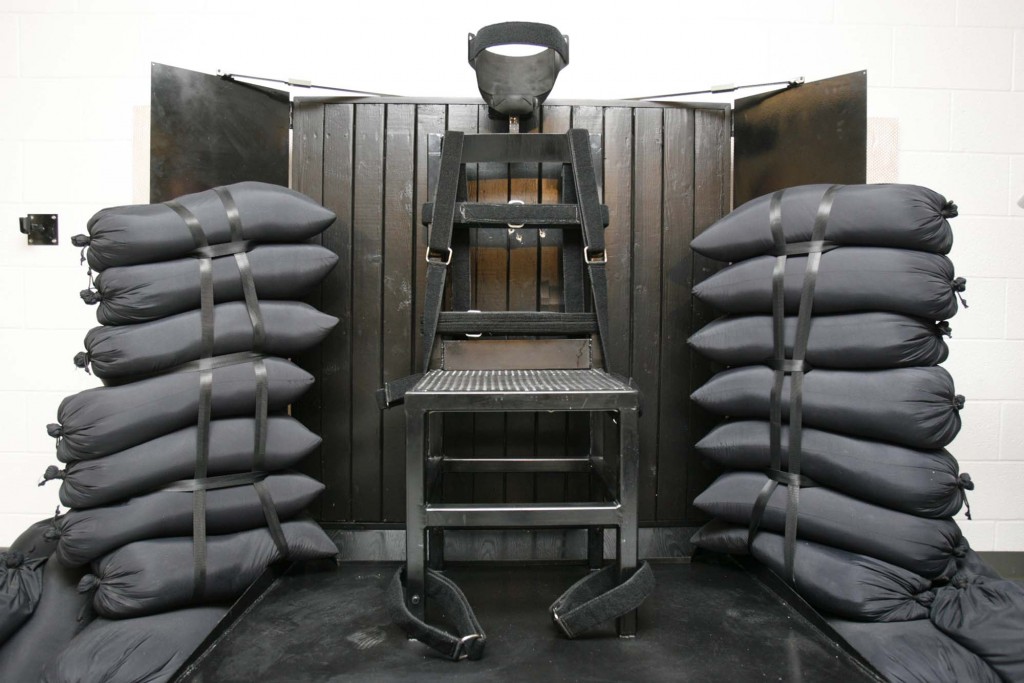- California Assembly OKs highest minimum wage in nation
- S. Korea unveils first graphic cigarette warnings
- US joins with South Korea, Japan in bid to deter North Korea
- LPGA golfer Chun In-gee finally back in action
- S. Korea won’t be top seed in final World Cup qualification round
- US men’s soccer misses 2nd straight Olympics
- US back on track in qualifying with 4-0 win over Guatemala
- High-intensity workout injuries spawn cottage industry
- CDC expands range of Zika mosquitoes into parts of Northeast
- Who knew? ‘The Walking Dead’ is helping families connect
Utah lawmakers vote to bring back executions by firing squad

FILE – This June 18, 2010, file photo shows the firing squad execution chamber at the Utah State Prison in Draper, Utah. Utah’s Gov. Gary Herbert will not say if he’ll sign a bill to bring back the firing squad but does say the method would give Utah a backup execution method. Herbert’s spokesman Marty Carpenter issued a statement about the bill Tuesday in response to questions from reporters. Utah’s Senate is set to cast a final vote on the bill this week. It would call for a firing squad if lethal injection drugs cannot be obtained 30 days before an execution. (AP Photo/Trent Nelson, Pool, File)
SALT LAKE CITY (AP) — A vote by Utah lawmakers to bring back executions by firing squad is the most dramatic illustration yet of the nationwide frustration over bungled executions and shortages of lethal-injection drugs.
Utah and several other states are scrambling to modify their laws on the heels of a botched Oklahoma lethal injection last year and one in Arizona in which the condemned man took nearly two hours to die. Meanwhile, Texas executed a Mexican mafia hit man Wednesday evening with its second-to-last dosage of drugs.
Utah Republican Gov. Gary Herbert has declined to say if he will sign the firing-squad bill, a decision that’s not expected for a week or so.
“States are wondering which way to go, and one way is to send up a warning flag that if you don’t allow us freedom in this lethal-injection area, we’ll do something else,” said Richard Dieter, executive director of the Washington, D.C.-based Death Penalty Information Center, which opposes capital punishment. “This might be a message rather than a preferred route of punishment.”
States have struggled to keep up their drug inventories as European manufacturers opposed to capital punishment refuse to sell the components of lethal injections to U.S. prisons. The Texas deadline is the most imminent, but other states are struggling, too.
The Utah bill’s sponsor, Republican Rep. Paul Ray, argues that a team of trained marksmen is faster and more humane than the drawn-out deaths involved when lethal injections go awry.
Though Utah’s next execution is probably a few years away, Ray said Wednesday that he wants to settle on a backup method now so authorities are not racing to find a solution if the drug shortage drags on.
He’s hopeful that the proposal will become law, saying he thinks the governor would have already announced his intention to veto it if that were his plan.
Opponents, however, said firing squads are a cruel holdover from another era and will earn the state international condemnation.
Lawmakers stopped offering inmates the choice of firing squad in 2004, saying the method attracted intense media interest and took attention away from victims.
Utah is the only state in the past 40 years to carry out such a death sentence, with three executions by firing squad since the U.S. Supreme Court reinstated the death penalty in 1976. The last was in 2010, when Ronnie Lee Gardner was put to death by five police officers with .30-caliber Winchester rifles in an event that generated international interest and elicited condemnation from many.
The American Civil Liberties Union decried Gardner’s execution as an example of the “barbaric, arbitrary and bankrupting practice of capital punishment.” Religious leaders at the time called for an end to the death penalty at an interfaith vigil in Salt Lake City.
Three more death-row inmates who chose firing squad before the law changed would still have the option after their appeals are exhausted. If those executions go forward, prison authorities will choose the gunmen from a pool of volunteer officers, starting with those in the area where the crime happened, Ray said.
“We’ve always had a lot more volunteers than actually had spots,” he said.
Under the new measure, the method would be based solely on the availability of lethal-injection drugs, not an inmate’s choice.
Utah’s next execution probably won’t happen for at least a few years, said Tom Brunker, the state attorney who oversees capital cases.
One person nearing a possible execution date is Ron Lafferty, the longest-serving death row inmate who claimed God directed him to kill his sister-in-law, Brenda Lafferty, and her baby daughter in 1984 because of the victim’s resistance to his beliefs in polygamy.
The U.S. Supreme Court ruled back in 1897 that death by firing squad was legal, Brunker said, but he expects a constitutional challenge if the bill becomes law and an execution is scheduled to use a firing squad.
“It has the potential to slow it down the first time it’s on deck,” Brunker said.
University of Utah criminal law professor Shima Baradaran said she doesn’t see a constitutional challenge succeeding because the federal government generally leaves capital punishment decisions to the states, and the firing squad has not been declared cruel and unusual.
State laws that allow methods other than lethal injection for executions are not unique to Utah. In Washington, inmates can request a hanging. In New Hampshire, hangings are the default method if lethal injection cannot be given.
Outside the U.S., 54 countries allow executions by gunshot, including China, Vietnam, Uganda and Afghanistan, according to Cornell University Law School’s Death Penalty Worldwide project. Of those, 41 countries allow full firing squads while the others do it differently, such as by a single bullet at close range. Fewer than half of those countries have done a firing squad execution in the last decade, the school’s research has found.
Most Utah lawmakers are Mormon, but the firing-squad effort does not seem linked to any teachings or doctrine from the Salt Lake City-based Church of Jesus Christ of Latter-day Saints. The Mormon church takes a neutral position on capital punishment, and church leaders declined comment Wednesday on the measure.
During the mid-1800s, then-Mormon President Brigham Young promoted the practice of blood atonement, the idea that a person guilty of murdering an innocent person must shed his own blood as compensation, said Philip Barlow, a professor of Mormon history and culture at Utah State University.
But that school of thought was abandoned after Young’s death, and that part of church history is hardly known by most Mormons today, he said.
















polygamy
November 17, 2017 at 12:47 AM
BibMe: Free Bibliography & Citation Maker – MLA, APA …